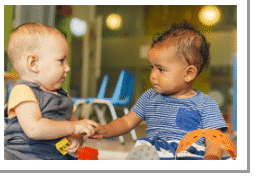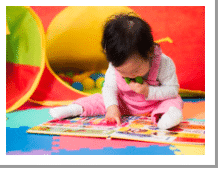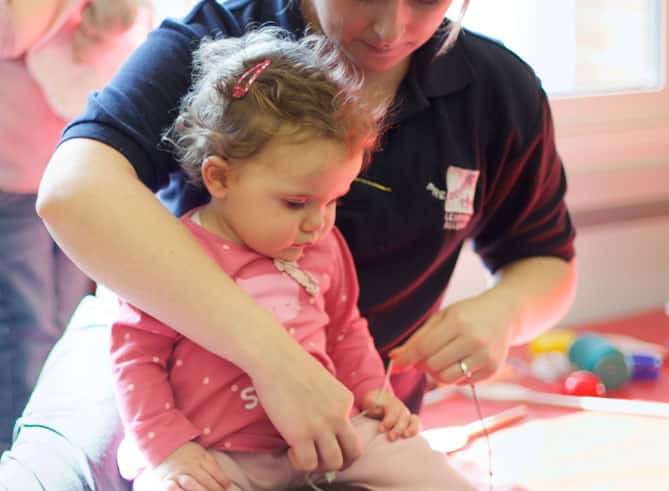
My name is Anne I am an Early Years Practitioner and trained Henry Facilitator and I run the Little Explorers sessions.
We have been using Five to Thrive to look at how your baby’s brain grows better, when you do these five simple things that feed the brain –
RESPOND, CUDDLE, RELAX, PLAY, and TALK
This week I am talking about your baby’s transition into childcare.
One of the toughest things you’ll probably do if you return to work after having a such a long time off with your baby is settle them into childcare. It might have just been yourself and no other caregiver so here are some parents’ tips.
Settling your baby into a new childcare routine – whether that’s a nursery, childminder, nanny, pre-school, children’s centre or with a relative – is a big adjustment. It can be an emotional time for parents and babies.
The transition will be different for everyone, but here we look at ways of making the adjustment slightly easier.

Leaving your baby with their childcare provider for the first time can be very difficult and many parents feel upset, anxious and nervous.
Remember, it’s a big change for all of you and feeling tearful and worried is natural.
And, if it takes your baby a while to settle in, some parents can feel guilty about leaving them in the care of others or for enjoying the time at work without their little one.
It’s really important not to be hard on yourself. Life is all about balance and, once your baby is settled, your decisions about returning to work and childcare will start to feel more comfortable and you’ll all feel more used to the new arrangement.
Tips for the early days
As difficult as it may sound when you’re missing your little one, you could try to focus on the positives of being at work, such as professional fulfilment, career advancement, adult conversations and, of course, your salary.
For the first few weeks it might be worth factoring in a few extra minutes after drop-off so you can take deep breaths and compose yourself rather than immediately rushing onto a train or into work while you’re upset.
Some parents say distractions help – listening to music on the journey, or getting involved in a task as soon as they arrive at work.
Having time to yourself on the commute to read, think or email friends – and carrying a work bag rather than a changing bag – can also be small pleasures that you never appreciated before!
You may look forward to simple things like going to the toilet on your own or drinking a cup of tea while it’s hot. Or you could plan a nice lunch and catch up with colleagues.

When you return to work you may appreciate time with your baby even more, whether it’s a bath together when you get home, snuggling up with a story or a trip out together on days off.
Some parents like to bring reminders of their little one to work to help them through the day, whether that’s photos and videos on their phone or a favourite toy.
Keeping in contact with your childcare provider can also help reassure you that your baby is content and stimulated.
Staying in touch
The most important thing is that you’re comfortable with your childcare choice. Some childcare settings will send photos or videos through the day, or you can look forward to reading a diary about their activities at the end of the day.
Some providers might be happy to send you a text update, or for you to phone if you need particular reassurance. Discuss this with your childcare provider beforehand so you know the best ways to keep in touch.
If you have any reservations about your childcare at all, try to get them sorted out because the happier you feel with the childcare setting the less stressful the transition will be.
Dealing with your child’s emotions
Every child is different, so the way they settle into their new childcare setting will vary hugely. Some seem to take it in their stride, while others may cry a lot, which can be distressing.
Remember your childcare provider is professional, experienced and will have seen most scenarios before – so they’ll know what your baby needs and how to comfort them.
It’s good to remind yourself that babies are easily distracted. Therefore, even if your little one is crying when you walk out of the door, the chances are that a few minutes later they will be engrossed in a book or toy.

This is a big change for your baby and this can show itself in lots of different ways such as night-time waking when they’ve previously slept well or being more fussy than usual.
And, even a child who appeared to settle into their childcare fairly easily at the start, may seem to regress later on and become tearful when left. Try to be patient and give lots of reassurance and, in time, things should settle down again.
Practical tips
Settling your child in gradually is often the best way, so they’re given time to get used to the environment, people and new routines.
Depending on your child’s age, many nurseries and childminders will suggest a phased introduction, where you stay with your baby for the first couple of short sessions, then you leave them for a few hours, before building up to a full day. However this may look different because of social distancing guidelines, check with your childcare provider on their current policy on this.
Ultimately it’s your decision on how to make the settling in period easiest for baby and you. Fiona Doyle, mum to Ciara and Branch Co-ordinator for NCT Haringey branch, has set up her own nursery. She says: ‘Try to have a smile on your face. Even if you’re crying inside at the thought of leaving them all day, make sure your little one doesn’t pick up on your distress.’
In addition, even though they may be young, it’s still worth talking to them and explaining the fun they’ll have. It’s a good idea to take walks or drives to the childcare setting to get your little one familiar with the journey and area.
Managing the morning rush
Many parents have a more relaxed schedule while on maternity/paternity leave, so it can be hard getting yourselves and baby out of the house in the morning. It helps to split up drop-offs and pick-ups between you if you can, if not you might need to be a bit more organised.
Setting out clothes the night before and packing your own and baby’s bag (replenishing nappies, wipes, spare clothes and anything else they’ll need for the day) is a good idea.
Most childcare providers don’t recommend a long-draw-out goodbye even if your baby is crying. A top tip is to keep it quick. The longer you hang around the longer your child thinks there’s a chance of going home again. As soon as you’re gone your baby will accept they’re staying for the day and will settle well.
Try to remain at the entrance and avoid going into the play areas. It’s best for your baby to associate the play areas with being away from you and it can be confusing, and all the more distressing, if you sit down with them and then disappear. Your childcare provider will let you know their current guidelines on drop off and pick up procedures.
Arranging pick ups
Young children will often cry as they’re tired from all the new sights and sounds, but it doesn’t mean they’ve had a bad experience or that they don’t want to go home. It may be just a general ‘letting-go’ of emotions and also because they know their mummy or daddy has the best comforting cuddle!
When it comes to pick-ups, many parents say they can’t wait to see their baby,but the reaction they get is sometimes less than positive. Pick-ups can also be stressful if you had a busy day at work. Try to be firm with colleagues and bosses about the time at which you need to leave work so you don’t end up rushing.
You’ll all be more tired while you’re adjusting to working life again and baby is getting used to childcare.
Take it as easy as you can for the first few weeks try to get to bed early, leave non-essential household jobs, don’t plan too much for weekends and make time to talk to your partner or friends about how you’re feeling.

Remember, settling your baby into childcare can be a roller-coaster for all the family and, unfortunately, tears and worries are a natural part of this. But, rest assured, things will settle down and you will all adjust to this new stage. You may find the benefits for all of you end up outweighing any teething troubles.
And, of course, if it’s not working for you or your child, you can always change your mind and look into other arrangements. So try not to worry too much and be kind to yourself during this time of change.
The sooner we get back to some normality and routine it will be much easier for yourself and your baby.
If you need support finding Childcare in Lewisham why not sign up for our FREE ZOOM SESSIONS?
There will be Information on:
- Finding a nursery
- Choosing a childminder
- Free Early Education Entitlement (FEEE)
- Extended 30 hours for 3 and 4-year-olds
- Tax Free Childcare
Sign up via our online booking form





